Search the Special Collections and Archives Portal
Search Results
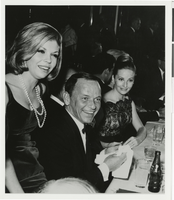
Photograph of Nancy Sinatra and Frank Sinatra during his performances with Count Basie, Las Vegas, November 1964
Date
Archival Collection
Description
Nancy Sinatra (left), her father Frank Sinatra, and an unidentified woman. The occasion was "Frank Sinatra in Concert with Count Basie" in November 1964.
Image
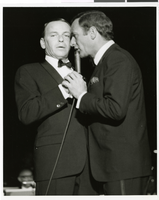
Photograph of Frank Sinatra and Joey Bishop at the Copa Room in the Sands Hotel, Las Vegas, April 1966
Date
Archival Collection
Description
Frank Sinatra (left) and Joey Bishop onstage at the Copa Room in the Sands Hotel, April 1966.
Image
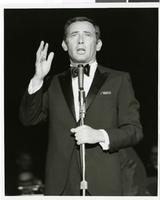
Photograph of Joey Bishop performing at the Sands Hotel, Las Vegas, April 1966
Date
Archival Collection
Description
Joey Bishop singing onstage at the Sands Hotel during one of the Rat Pack's "Summit Meetings" in April of 1966.
Image
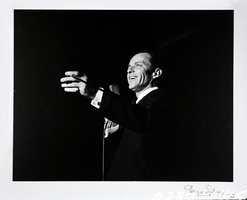
Film transparency of Frank Sinatra singing onstage at the Sands Hotel, Las Vegas, circa 1960s
Date
Archival Collection
Description
Frank Sinatra performing in the Copa Room at the Sands Hotel in the 1960s.
Image
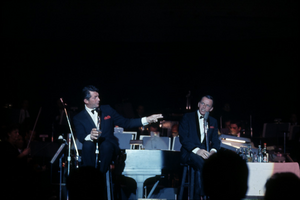
Slide transparency of Frank Sinatra and Dean Martin onstage in the Copa Room, Las Vegas, circa 1960s
Date
Archival Collection
Description
Dean Martin (left) and Frank Sinatra performing at the Copa Room in the Sands Hotel sometime in the 1960s.
Image

Slide transparency of Frank Sinatra and Dean Martin onstage at the Copa Room in the Sands Hotel, Las Vegas, circa 1960s
Date
Archival Collection
Description
Dean Martin (left) and Frank Sinatra performing at the Copa Room in the Sands Hotel sometime in the 1960s.
Image
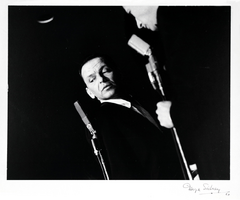
Film transparency of Frank Sinatra and Joey Bishop, onstage at the Sands Hotel, Las Vegas, 1960
Date
Archival Collection
Description
Frank Sinatra and Joey Bishop performing in the Copa Room at the Sands Hotel.
Image
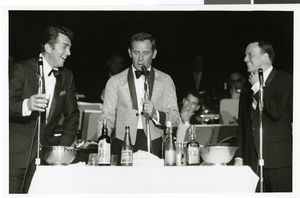
Photograph of Dean Martin, Joey Bishop and Frank Sinatra performing at the Sands Hotel, Las Vegas, April 1966
Date
Archival Collection
Description
From left to right, Dean Martin, Joey Bishop and Frank Sinatra, onstage at the Sands Hotel during one of their "Summit Meetings" in April of 1966.
Image
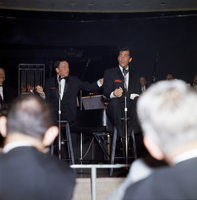
Film transparency of Dean Martin and Frank Sinatra on opening night of their show at the Sands Hotel, Las Vegas, January 22, 1964
Date
Archival Collection
Description
Dean Martin and Frank Sinatra on opening night of their show at the Sands Hotel on January 22, 1964.
Image
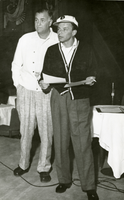
Photograph of Frank Sinatra and Jack Entratter at a rehearsal of Ziegfeld Follies, Las Vegas, June 1954
Date
Archival Collection
Description
Jack Entratter (left) and Frank Sinatra at a rehearsal of "Ziegfeld Follies" in the Copa Room of the Sands Hotel in June 1954.
Image
